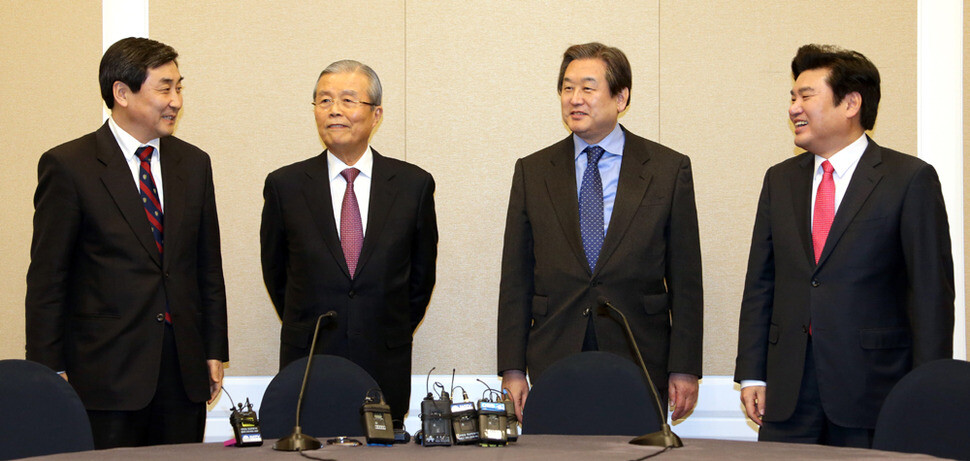hankyoreh
Links to other country sites 다른 나라 사이트 링크
Ruling party refuses mediation on anti-terror filibuster

The ruling and opposition parties in the National Assembly failed to bridge their differences on a controversial anti-terror bill, where an opposition filibuster entered its third day on Feb. 26.
The setback comes despite an informal meeting of parliamentary leaders in the Assembly’s main hall to attempt negotiations for the bill’s passage. While the opposition Minjoo Party of Korea (MPK) showed signs of concession that day in saying it would accept a mediation plan proposed by Speaker Chung Ui-hwa, the discussions failed to reach common ground, with the ruling Saenuri Party (NFP) insisting on swift passage of the version already presented on Chung’s authority.
“Speaker Chung Ui-hwa has presented a mediation plan for supplementary provisions on wiretapping that are expected to cause serious harm to the public. We would be willing to accept that,” said MPK floor leader Lee Jong-kul in a joint meeting of his party’s emergency and election countermeasures committees on Feb. 26.
The plan, developed by the National Assembly legislation office, included additional terms restricting the Saenuri’s version’s more comprehensive permission of National Intelligence Service (NIS) wiretapping “for the purposes of terror prevention” to “situations of concern in terms of guarantees of national safety.”
“We had submitted a plan that would set up an anti-terror organization around the Ministry of Public Safety and Security, but we would also accept the NIS doing it,” Lee said.
“If the ruling party accepts this and addresses a few matters of content, we will immediately halt the filibuster - which the public has shown its support for - and apologize,” he added.
Speaking after a general lawmakers’ meeting called that afternoon to discuss the anti-terror bill’s passage, MPK floor spokesperson Kim Gi-juhn said he had “reported there that the floor leader was willing to accept the Speaker’s mediation plan.”
“The mood suggested the lawmakers would accept it without any major problems,” Kim added.
Meanwhile, the Saenuri Party continued to insist it would not make any more concessions even after the opposition’s plan.
“The anti-terror bill presented by the Saenuri Party has more controls on the NIS than the plans under the Kim Dae-jung and Roh Moo-hyun administrations,” said Saenuri floor leader Won Yoo-chul at a floor countermeasures meeting on Feb. 26, referring to two liberal-identified Presidents in power between 1998 and 2008.
“This legislation has come to incorporate many of the opposition’s demands and arguments over the course of bipartisan meetings over the past several months,” Won contended.
As examples of concessions, Won said the anti-terror bill presented at the current plenary session places a new anti-terror center under the Office of the Prime Minister rather than the NIS; assigns the NIS information collection, questioning, and tracking rights rather than investigative authority; establishes a human rights protection officer position to prevent abuse of NIS authority; and sets up controls against false accusations and abuse of power by related government employees.
By Lee Se-young and Hwang Jun-beom, staff reporters
Please direct questions or comments to [english@hani.co.kr]

Editorial・opinion
![[Column] Park Geun-hye déjà vu in Yoon Suk-yeol [Column] Park Geun-hye déjà vu in Yoon Suk-yeol](https://flexible.img.hani.co.kr/flexible/normal/500/300/imgdb/original/2024/0424/651713945113788.jpg) [Column] Park Geun-hye déjà vu in Yoon Suk-yeol
[Column] Park Geun-hye déjà vu in Yoon Suk-yeol![[Editorial] New weight of N. Korea’s nuclear threats makes dialogue all the more urgent [Editorial] New weight of N. Korea’s nuclear threats makes dialogue all the more urgent](https://flexible.img.hani.co.kr/flexible/normal/500/300/imgdb/original/2024/0424/7317139454662664.jpg) [Editorial] New weight of N. Korea’s nuclear threats makes dialogue all the more urgent
[Editorial] New weight of N. Korea’s nuclear threats makes dialogue all the more urgent- [Guest essay] The real reason Korea’s new right wants to dub Rhee a founding father
- [Column] ‘Choson’: Is it time we start referring to N. Korea in its own terms?
- [Editorial] Japan’s rewriting of history with Korea has gone too far
- [Column] The president’s questionable capacity for dialogue
- [Column] Are chaebol firms just pizza pies for families to divvy up as they please?
- [Column] Has Korea, too, crossed the Rubicon on China?
- [Correspondent’s column] In Japan’s alliance with US, echoes of its past alliances with UK
- [Editorial] Does Yoon think the Korean public is wrong?
Most viewed articles
- 1[Column] Park Geun-hye déjà vu in Yoon Suk-yeol
- 2N. Korean hackers breached 10 defense contractors in South for months, police say
- 3Will NewJeans end up collateral damage in internal feud at K-pop juggernaut Hybe?
- 4Kim Jong-un expressed ‘satisfaction’ with nuclear counterstrike drill directed at South
- 5[Editorial] New weight of N. Korea’s nuclear threats makes dialogue all the more urgent
- 6[Cine feature] A new shift in the Korean film investment and distribution market
- 7[Column] ‘Choson’: Is it time we start referring to N. Korea in its own terms?
- 8[Column] The clock is ticking for Korea’s first lady
- 9[Editorial] Japan’s rewriting of history with Korea has gone too far
- 10Thursday to mark start of resignations by senior doctors amid standoff with government